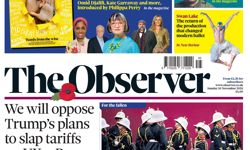Newsmen relish the real nature of news: simply, its unpredictability. Chelsea beat Burnley 6-0 isn't news. Burnley thrash Chelsea by six after jilted Wag's Rottweiler bites John Terry is absolute clear-the-front-page stuff. And so to the weeks and months building now to the real - or, at least, voluminous - news of a general election.
What's unpredictable here as newspaper editors puff out their chests and prepare for the solemn moment called 'endorsement', the time every four or five years where the Daily Bugle is expected to say something definitive that will be long remembered if it's wrong? You'd assume, from the immense fuss the Sun made last summer, that a word or two hailing Prime Minister Dave would be the clinching factor 'wot won it' for the Tories. And you might equally assume, as Messrs Clegg and Brown tour newspaper boardrooms now, playing concerned, accessible friends of our struggling media, that Labour and LibDems tremble before the power of the press as well.
Didn't Rupert famously welcome Tony Blair to his private Paradise island off the coast of Oz before backing New Labour in 1997? Isn't James Murdoch a paid-up member of the Notting Hill set, one who even welcomes Tory help when he writes his speeches? The aura of importance and self-importance intermingled could hardly be denser.
Don’t upset the readers
But in fact, close up, it all looks more empty than intimidating. For the really simple fact is that newspaper proprietors, just like the editors they employ, are constrained by influences they prefer to forget during tea and buns in Downing Street: like their readers, for one thumping thing. If you're the editor of the Daily Express, for instance, reader research tells you that the vast bulk of the people who buy you each morning are middle-aged to old and overwhelmingly likely to vote Tory. Advising them, out of the blue, to switch to Brown is a sales suicide note beyond inanity, a confusion of branding that would send Mr Richard Desmond puce at the thought.
So the Express and Sunday Express will vote Conservative this time round again. Of course. So, perhaps more grudgingly but for precisely similar reasons, will the Daily Mail and Mail on Sunday. So will the Sunday Times (which voted for Michael Howard in 2005, and won't change now that the Conservatives have a chance of victory). Put the Telegraph and Sunday Telegraph automatically in Cameron's battalion as well, add the Daily Star for a nipple's worth of propagandising, and what have you got left? The Mirror, and its two Sunday partners, must back Labour, because they always do - and because they're not much interested in politics these days anyway. The News of the World will probably succumb to the blandishments of its ex-editor, now David Cameron's press chief, but its political clout is limited, too.
The less predictable ones
No, the really unpredictable decisions - the ones with inherent news interest - are few and far between. Reckon that the Times will switch from Labour to Tory, with some interesting arguments attached. Reckon that the Guardian, which branded Brown a hopeless loser and wanted him gone last year, will have a good deal of explaining to do before it finally ends up backing a Labour vote in most cases, a LibDem vote in constituencies where Clegg's candidates can win - and maybe a small list of Tories whose participation might serve Parliament well. Reckon that the Independent will work some variation on a parallel theme and - endorsement wise - that only leaves two pulsating shows in town.
One (on a small but influential stage) stars the Financial Times. We are where we are because of profound economic crisis. Which party does the Pink One pick to get us out of it? And can a global paper with a huge and important European readership stomach a vote for the sceptic Conservatives? Probably not.
The second pulsation, though, looks back as well as forward, and bites a lip as well as kicks a heel. Did the Sun - with a new team in charge, new chairman James Murdoch, new CEO Rebekah Brooks, new editor Dominic Mohan - actually get it wrong? Did they fall off the fence too soon? Would Rupert Murdoch himself - a long-term Cameron doubter - have gone along for the ride if "his people" in London hadn't said what they wanted to do, and when they needed to do it, on the back of some modestly convincing Tory opinion poll leads?
At once we're into the second phase of newspaper activity during election campaigns - a phase that has little relevance to editorial pundits sitting at silent computer terminals and much, much more to front page headline writers going for broke as they prophesy "Nightmare on Kinnock Street" and parallel disasters. Can the Sun, watching as the Tories' poll lead has slipped a bit through recent months, moving from clear majority to hung Parliament territory, afford the blow to its esteem that wot not winning would inflict? How do you cope with guessing wrong - or failing to deliver?
For the calculations beyond more straightforward endorsements are byzantine at best. Most of the time, a newspaper's readership profile and general proprietorial framework cover most eventualities and answer most questions. Vested interests trump supposed independence. Telling readers what they expect to be told when they buy you matters hugely. The Daily Telegraph is not about to have a Socialist hot flush. But then things get more complicated.
Some of those things, especially in the build-up to a crucial campaign, are professional (and personal) rather than ordained. The Times has not spent much of the last decade wondering whether Michael Ashcroft is a suitable Tory power-broker, party donor, treasurer and foreign policy guru because of some hidden agenda. Rupert Murdoch didn't tell them to try to turn over stones. They did it because they were curious journalists exploring curious regions - and carrying doggedly on.
In just the same way - looking further back - the Guardian didn't set out to bury John Major in the sleaze of cash for questions. The story just happened; it would have been pursued whichever party was involved - exactly as the Telegraph didn't spare Tory MPs ramping up their expenses last year.
Who would be a proprietor?
And, equally, the reasons why people become owners of newspapers in the first place and claim to have influence over them are human-being complicated, too. Does anybody quite understand why a retired KGB oligarch should wish to buy the London Evening Standard, make it a twitch or two more liberal and turn it free? Did it - indeed does it - seem logical for septuagenarian, reclusive twins living in a castle on a tiny Channel Island to make the two Telegraphs their own? What's the benefit to a shareholder-dominated public company like Trinity Mirror in owning three national papers trapped in seemingly relentless decline?
The questions go on and on; and so do the contradictions. You may fancy a knighthood or peerage, but these days there are easier ways of earning them. You may want to make yourself a fortune, in which case newspapers go to the back of the queue. Or you may enjoy power for its own sake, for the sake of influence and access in high places.
In fact, only Rupert Murdoch - with a few side glances to Rothermere of the Mail - still fits this bill: and even he plays a fragile game. Does he truly believe that the Sun can turn electoral tides? If he does, isn't he usually pretty cautious before he gets his surfboard out? Weren't three endorsements in a row for Tony Blair mere glimpses of the obvious rather than daring gamble? Why, over in New York before the last presidential campaign, did Murdoch, owner of Fox News and Daily Post, stage a prolonged courtship with Hillary Clinton (until Obama knocked her out of the race)? And why does the new owner of the Wall Street Journal appear so anxious to keep Fox's cable cash rolling in, but not to let its ultra-right CEO seem to represent News Corp values or policies?
Here, beyond the bravado, we glimpse the cross-currents of uncertainty that run through every election campaign, the course of a democratic contest that no press baron or prime minister can ever take for granted, part illusion, part delusion.
Setting the tone
Of course the press has clout once a campaign starts, but often more subtle and indirect than blatantly obvious. It can help dictate agendas from day to day. Is Gordon looking haggard and tired? Has Dave lost his bounce? Mood stories as well as fact stories wash over into TV and radio commentary. In speech and in print they reinforce each other, give a ring of confidence - or despair. And, naturally, anything you couldn't have predicted, any bad mistake, rates double the coverage.
We may have had one such mistake already from a Sun (and Murdoch son) tied too closely to the Tory cause and seeming, rather too awkwardly, to seek special favours on the satellite TV front in return. That has actually spiked a few of the Sun's big guns, and made any quid pro quos far more difficult. We can certainly expect enhanced rival coverage of any campaign promises that might make News International happy. But the essential fragility of so much that is written, and assumed, remains.
Serious academic studies and opinion polls, once elections are over, habitually conclude that newspapers and TV made very little difference to the flow of events - that, in short, the voters just did what they'd always intended. But that isn't quite how it seems once the race has started.
Then politicians will both fawn over and snarl at journalists. Then the plaintive phone calls to editors back at the ranch will grow apace. Then newspapermen will briefly feel important again.
It is not a true or a steady state. Circulation will go up a little if the contest is tight and rate a 20% box-out on election night. But then it will go down again. Some political correspondents will have seen their best contacts voted out. Some will have new pastures to play in off-the-record. And the business of re-positioning, of arm-twisting, of claiming more power than you possess, will start all over again. Unless, of course, much to the Bun's fury, there's a hung Parliament. In which case, it will probably never stop.










